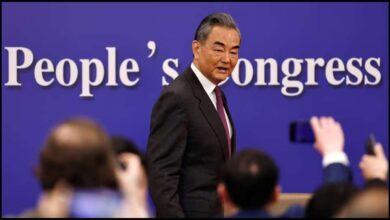Vladimir Putin, the president of Russia, arrives in China for the BRI summit and to meet with Xi Jinping
This week, Xi Jinping and Vladimir Putin will meet once again in Beijing in an effort to further strengthen the “no-limits” alliance between their two nations, which they first toasted with cake and vodka ten years ago.
The two leaders have a close friendship, with Putin praising Xi as his “reliable partner” and Xi referring to his Russian counterpart as his “best friend.”
Despite a decade of deteriorating ties with the West, as seen by China’s refusal to denounce Russia’s continuing invasion of Ukraine, their relationship has remained stable.
Putin’s participation at a leaders summit this week in the Chinese capital is not just a rare occasion for the Russian president to go abroad but also a tribute to Xi’s Belt and Road development program.
The presence of the Russian delegation in Beijing, according to Alicja Bachulska, a specialist in Chinese foreign policy at the European Council on Foreign Relations, is significant for Moscow.
“It will legitimize Russia in the eyes of the world by giving Putin the appearance of not being totally alone in a war situation,” she told AFP.
At a conference in Indonesia in 2013, Xi and Putin celebrated Putin’s birthday by sharing cake and vodka shots with each other.
Since then, they have become closer. In 2018, Xi took Putin on a high-speed train through China to bake traditional steamed buns.
On Xi’s following trips to Russia, Putin paid it forward by serving caviar-topped pancakes and taking him on a river tour.
The Russian president even surprised Xi with ice cream at a summit in Tajikistan in 2019 to celebrate his own birthday.
Their early 1950s birth months apart and shared fatherhood of daughters are only two of the commonalities in the two men’s lives.
They are the offspring of two socialist titans, with Putin having served as a former Soviet intelligence officer and Xi descended from a dynasty of Communist revolutionaries.
Both are troubled by the fall of the USSR, which for Xi and Putin was a “major geopolitical disaster” and served as a lesson for the Chinese Communist Party.
And during their protracted and ever more unopposed years in power, both have cited ideas of national revitalization while repressing opposition.
called “PRO-Russia Neutrality”
Beijing and Moscow have also grown closer in recent years, mirroring the bonds between their leaders and seeing one another as a counterweight to the US-led West.
As a “comprehensive strategic partnership” with “no limits” on possible collaboration, the two nations characterize their connection.
Despite Russia’s frontal attack on Ukraine since last year, which forced Moscow and Putin into international isolation, their friendship has persisted.
Beijing has resisted demands to denounce the incursion and presented itself as an impartial party, holding off on arming Moscow.
However, Iran has joined Russia in condemning Western nations, particularly the NATO defense alliance, for fostering the circumstances that led to the start of the conflict.
Beijing’s position on the conflict was characterized as “pro-Russia neutrality” by Joe Webster, an authority on China-Russia ties at the Atlantic Council.
According to him, this has meant providing Moscow with essential diplomatic, economic, and non-lethal military support against a backdrop of increasing bilateral commerce.
He did, however, add that Yevgeny Prigozhin’s failed insurrection this summer “shocked Beijing and forced it to recalibrate relations with Moscow.”
In order to maintain tight links with Russia regardless of who holds the position of power in the world, Beijing is “now seeking to depersonalize the relationship and institutionalize ties between the two political systems,” according to Webster.
Customer Relationship
The minor change in language highlights how unbalanced the China-Russia relationship is, with Moscow increasingly depending on its neighbor to support its economy and keep its military machine running.
Moscow has been forced into a situation where it is unprecedentedly reliant on China, according to Bjorn Alexander Duben, a specialist of international relations at China’s Jilin University.
He questioned if Russia was moving toward a client relationship with Beijing because of “(Russia’s) continued economic engagement with China, which is) gradually turning into a relationship of direct dependence.”
According to analysts, Putin’s visit to the Chinese capital was more about bolstering his political standing than it was about closing expensive projects like the much-touted Power of Siberia-2 gas pipeline.
The Carnegie Russia Eurasia Center’s Alexander Gabuev said, “I don’t expect any kind of significant big deliverables this time. We might see results in the coming (months and) years with infrastructure projects being realized.”
“China is the owner of all these cards. Russia would be keen to have an agreement publicized, but China has influence and can set the pace, the official added.







